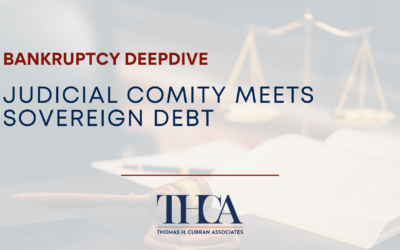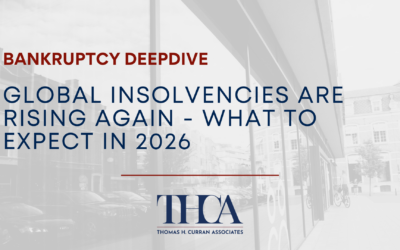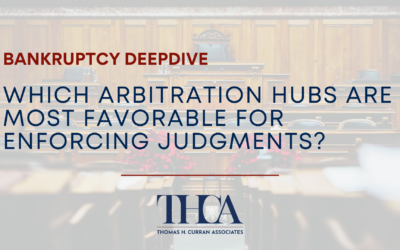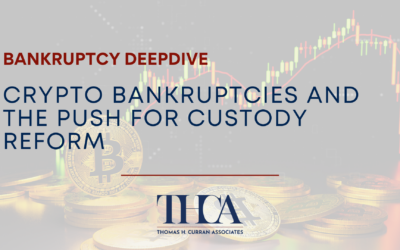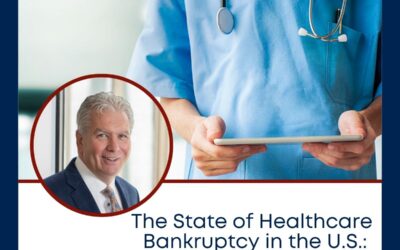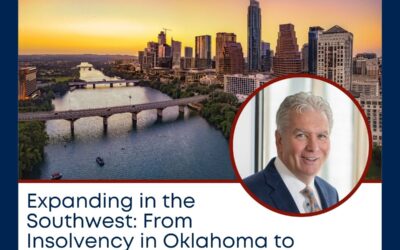Chapter 7 Business Bankruptcy Attorney
When it has become clear that a business is no longer financially viable, filing for Chapter 7 bankruptcy is often the best way to wind up operations in an orderly manner. In Chapter 7, the Bankruptcy Court will turn most of the business’s assets over to a bankruptcy trustee who will distribute them to creditors to the extent that is possible. Once the liquidation is complete, the company will be dissolved and its owners will be free to pursue other opportunities.
It is important to note that when a business files for Chapter 7 bankruptcy it does not eliminate any personal obligations its owners may have to pay the business’s debts. This is why most Chapter 7 business bankruptcies are filed by corporations or limited liability companies. When a business is operating as a partnership, the partners are personally liable for the debts of the business, unless it is operating as a limited liability partnership in a state that allows that type of business structure. Therefore, in most cases of partnership bankruptcy the partners will also need to file for Chapter 7 bankruptcy protection. If the business operates a sole proprietorship, filing for personal Chapter 7 bankruptcy will usually wipe out the debts of both the proprietor and the business.
Chapter 7 bankruptcy is most appropriate for a business where the owners and managers see no path to profitability, the company lacks significant assets, and operations need to be wound down. For business owners and managers who believe their company can return to profitability a reorganization under Chapter 11 is usually the better option. Chapter 11 allows the business to continue its operations while restructuring and paying off at least some of its debt to creditors.
The filing of a Chapter 7 bankruptcy case creates a bankruptcy estate that becomes the temporary legal owner of the debtor’s non-exempt property. The United States Bankruptcy Code and many states exempt certain of the debtor’s assets from being placed in the estate. The bankruptcy trustee serves as a representative of the estate and works with the Bankruptcy Court to distribute the bankruptcy estate’s assets to creditors. Those creditors with liens on property in the estate are known as secured creditors, while those without liens are unsecured creditors.
Chapter 7 provides debtors with an automatic stay preventing creditors from taking further collection action against the debtor without the permission of the Bankruptcy Court. The automatic stay is an injunction that is issued immediately against all creditors upon the filing of a bankruptcy petition. An additional benefit of the stay is that the bankruptcy action automatically halts most non-bankruptcy proceedings involving the debtor in other courts.
In cases where there are secured creditors, the debtor needs to tell the court how it wants the collateral to be handled when it files for bankruptcy by filing a statement of intention. The most common method for repaying secured creditors is simply to give the pledged property back to the creditor. If the debtor wants to retain the secured property after the business is liquidated, the debtor has several available options, including redeeming the property by paying the creditor fair market value or entering into an agreement to continue making payments on the debt. The bankruptcy court may discharge the secured debt, but the creditor will still have the right to seize the collateral.
Unsecured creditors do not fare as well as secured creditors because they cannot take the debtor’s property to satisfy debt obligations. Unsecured creditors usually have 90 days after the bankruptcy filing to file their claims with the Bankruptcy Court. Should any assets remain in the estate after the secured creditors have been paid, the trustee may sell any of the debtor’s property that is not subject to a lien, or exempt, and distribute the proceeds to the unsecured creditors in the order dictated by the Bankruptcy Code.
After a Chapter 7 bankruptcy trustee has sold the debtor’s assets and repaid creditors to the extent possible, there is likely to be some remaining unpaid debt owed to the creditors. However, the creditors will be unable to collect because a Chapter 7 proceeding concludes with the dissolution of the debtor, leaving no party from which the creditors can collect.
Each Chapter 7 bankruptcy is unique and businesses need experienced attornies to guide them through the process. The attorneys at Thomas H. Curran Associates specialize in business bankruptcy and are skilled at quickly and efficiently wrapping up the affairs of a struggling business so that the company’s ownership and management are free to move on to new projects.
Bankruptcy Practice Results
Recent successful cases handled by the attorneys from Thomas H. Curran Associates. Find more here »
Supreme Court Denies Final Appeal, Finalizing Judgement Obtained by THCA
On June 24, 2024, the Supreme Court of the United States declined the petition to review filed by Sean Dunne and his ex-wife Gayle...
Thomas H. Curran Associates Secures Appellate Victory as Massachusetts Supreme Judicial Court Denies Appellant’s Attempt to Shortcut Ordinary Appellate Review
Thomas H. Curran Associates recently obtained an appellate victory in the Massachusetts Supreme Judicial Court on May 26, 2023, in the...
Thomas H. Curran Associates win is Affirmed in Florida, U.S. District Court – Client Wins Attorneys Fees
Law: Federal Rule of Civil Procedure 37(a)(5) Case: Premier Capital, LLC v. Larry Bryan (AP) Underlying Bankruptcy Case: In re Larry Bryan...
The Second Circuit Affirms Bankruptcy Fraud Judgment Obtained by Thomas H. Curran Associates, Recognizing the Continuous Concealment Doctrine
Law: Continuous concealment doctrine, 11 USC § 727(a)(2)(A), In re Olivier, 819 F.2d 550 (5th Cir. 1987); In re Boyer, 328 F. App’x 711,...
Thomas H. Curran Associates prevails on barring discharge due to fraud by debtor
Thomas H. Curran Associates recently secured a victory on behalf of an institutional asset manager, where the Bankruptcy Court for the...
Thomas H. Curran Associates prevails on post-trial motions and obtains full security for $23 million dollar financial fraud judgment on behalf of chapter 7 bankruptcy trustee
On February 8, 2022, the United States District Court for the District of Connecticut (Meyer, J.) enter its Order denying defendant Gayle...
Supreme Court Denies Final Appeal, Finalizing Judgement Obtained by THCA
On June 24, 2024, the Supreme Court of the United States declined the petition to review filed by Sean Dunne and his ex-wife Gayle...
Thomas H. Curran Associates Secures Appellate Victory as Massachusetts Supreme Judicial Court Denies Appellant’s Attempt to Shortcut Ordinary Appellate Review
Thomas H. Curran Associates recently obtained an appellate victory in the Massachusetts Supreme Judicial Court on May 26, 2023, in the...
Thomas H. Curran Associates win is Affirmed in Florida, U.S. District Court – Client Wins Attorneys Fees
Law: Federal Rule of Civil Procedure 37(a)(5) Case: Premier Capital, LLC v. Larry Bryan (AP) Underlying Bankruptcy Case: In re Larry Bryan...
The Second Circuit Affirms Bankruptcy Fraud Judgment Obtained by Thomas H. Curran Associates, Recognizing the Continuous Concealment Doctrine
Law: Continuous concealment doctrine, 11 USC § 727(a)(2)(A), In re Olivier, 819 F.2d 550 (5th Cir. 1987); In re Boyer, 328 F. App’x 711,...
Supreme Court Denies Final Appeal, Finalizing Judgement Obtained by THCA
On June 24, 2024, the Supreme Court of the United States declined the petition to review filed by Sean Dunne and his ex-wife Gayle...
Thomas H. Curran Associates Secures Appellate Victory as Massachusetts Supreme Judicial Court Denies Appellant’s Attempt to Shortcut Ordinary Appellate Review
Thomas H. Curran Associates recently obtained an appellate victory in the Massachusetts Supreme Judicial Court on May 26, 2023, in the...
Thomas H. Curran Associates win is Affirmed in Florida, U.S. District Court – Client Wins Attorneys Fees
Law: Federal Rule of Civil Procedure 37(a)(5) Case: Premier Capital, LLC v. Larry Bryan (AP) Underlying Bankruptcy Case: In re Larry Bryan...
Bankruptcy Areas of Expertise
- Bankruptcy Litigation
- Bankruptcy Trustee Representation
- Avoidance & Recovery Actions
- Chapter 11 Trustees & Examiners
- Discharge Litigation
- Bankruptcy Fraud Investigations
- Cross Border Foreign Litigation
- 363 Bankruptcy Sales
- Bankruptcy Preference Actions
- Involuntary Bankruptcy
- Chapter 11/13 Plan Objections
Bankruptcy News
Judicial Comity Meets Sovereign Debt
Judicial comity is a discretionary doctrine by which U.S. courts recognize the legislative, executive, or judicial acts of another nation,...
Global Insolvencies Are Rising Again – What To Expect in 2026
After several years of economic turbulence, a renewed rise in global insolvencies is expected in 2026. According to Allianz Trade’s Global...
Which Arbitration Hubs Are Most Favorable for Enforcing Judgments?
As insolvency disputes increasingly intersect with international arbitration, creditors are asking: which jurisdictions provide the most...
Crypto Bankruptcies and the Push for Custody Reform
The crypto sector remains under intense financial and regulatory scrutiny. The U.S. House of Representatives passed the Digital Asset...
The State of Healthcare Bankruptcy in the U.S.: Why 2025 Is a Turning Point
Jennifer Riggins sits down with Thomas Curran, Managing Partner of Thomas H. Curran Associates, to unpack the accelerating wave of...
Expanding in the Southwest: From Insolvency in Oklahoma to Asset Recovery in Texas
In this episode, Jennifer sits down with Thomas Curran, founder of Thomas H. Curran Associates, to explore the rapidly evolving world of...
Judicial Comity Meets Sovereign Debt
Judicial comity is a discretionary doctrine by which U.S. courts recognize the legislative, executive, or judicial acts of another nation,...
Global Insolvencies Are Rising Again – What To Expect in 2026
After several years of economic turbulence, a renewed rise in global insolvencies is expected in 2026. According to Allianz Trade’s Global...
Which Arbitration Hubs Are Most Favorable for Enforcing Judgments?
As insolvency disputes increasingly intersect with international arbitration, creditors are asking: which jurisdictions provide the most...
Crypto Bankruptcies and the Push for Custody Reform
The crypto sector remains under intense financial and regulatory scrutiny. The U.S. House of Representatives passed the Digital Asset...
Judicial Comity Meets Sovereign Debt
Judicial comity is a discretionary doctrine by which U.S. courts recognize the legislative, executive, or judicial acts of another nation,...
Global Insolvencies Are Rising Again – What To Expect in 2026
After several years of economic turbulence, a renewed rise in global insolvencies is expected in 2026. According to Allianz Trade’s Global...
Which Arbitration Hubs Are Most Favorable for Enforcing Judgments?
As insolvency disputes increasingly intersect with international arbitration, creditors are asking: which jurisdictions provide the most...
Contact Us
Are You In Need of Legal Counsel for a Bankruptcy Matter, Business Transaction, or Commercial Litigation?
Contact our team today.
Call us at (617) 207-8670 or use the quick contact form below.
Austin Office
7710 N. FM 620
Building 13-D
Austin, TX 78726
Boston Office
15 Broad Street
Suite 610
Boston, MA 02109
New York Office
305 Broadway, Suite 700
New York, NY 10007
London Office
The Leadenhall Building
Level 30
122 Leadenhall Street
London EC3V 4AB
Tags: chapter 7 business bankruptcy attorney business bankruptcy chapter 7 filing business bankruptcy chapter 7

